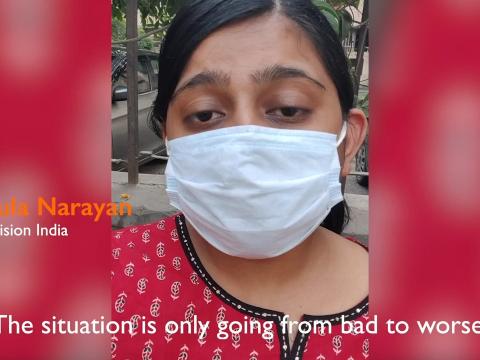'It's worse than a horror movie'

What you are seeing in the media with crematoriums being full and people dying because there are no oxygen supplies is all true. I have never seen anything like this. It’s worse than a horror movie.
I was at a hospital last week. It was a terrible scene. I saw a lady waiting outside in a rickshaw with her husband and she was trying to revive him even though he was already dead. There was another lady crying and rolling on the floor weeping. She had also lost her husband. He had been in an ambulance waiting outside the hospital for six hours, but they couldn’t take him inside because there were no beds. And so he died in the ambulance. I couldn’t count the number of ambulances waiting, there were so many. And that was just at one hospital.
I was there to pick up medicine for my husband Carlos. He has just been discharged from hospital after having COVID-19. He is only 28, but he got very sick. His oxygen levels were dangerously low, he couldn’t communicate because he was so breathless. I couldn’t go into the hospital to be with him, and so for four days I didn’t know how he was. I was at home with our one-year-old daughter Priscilla, and I started seeing news that hospitals in Delhi were running out of oxygen, including the one he was at. On my WhatsApp I would get news of this person dying, another person dying, this person not getting oxygen supply, another person not getting a bed and dying. I was bombarded with news of death. I would break down because I felt so helpless.
Now he is home and recovering. We are so lucky that he caught it before things started to spiral out of control. The oxygen that he received at the hospital is what saved his life. If not for that I may have lost my husband. I can't imagine how other people feel when they can’t get oxygen and lose their loved ones.
So many people are dying. Every 10 minutes I hear ambulance sirens. It’s been like this for the past 10-15 days.
You can imagine if the rich are suffering, what about the poor who don’t have an option to go to a hospital?
The first wave of COVID-19 hit urban areas, so rural areas were relatively safe. But this time it is spreading as migrant workers and labourers are going back home and taking the virus with them. In these rural areas there are no hospitals. There is little health care. These are places where people die from preventable diseases like diarrhoea.
I worry about the impact on the most vulnerable people who we work to help at World Vision, especially children. Their lives are at stake. Their parents have lost their jobs. Food is becoming scarce. They cannot go to school. Many have lost their parents. And even though they have better immunity, this second wave of COVID-19 has infected many children. We are hearing some cases of children dying too.
We have had a lot of crises here in India, but this is the worst to hit our country. Thousands of people are dying every day. And what we're hearing right now is that this is only going to get worse. They're saying that the peak of the second wave has not yet come. So you can imagine how many more cases there will be, how many more lives are at stake right now. And if we don't get the help we need, right now, we're going to lose so many more lives.
World Vision is here, providing lifesaving medical equipment to hospitals, health clinics, and people in desperate need across the country. Having access to oxygen saved my husband’s life, so I know that your support will save so many lives. Not a single bit of help that you provide will go in vain, I’ve seen it with my own eyes.
Mridula Narayan is a Communications Associate at World Vision India. She lives in Delhi with her husband and daughter.
Originally published by New Zealand Herald.